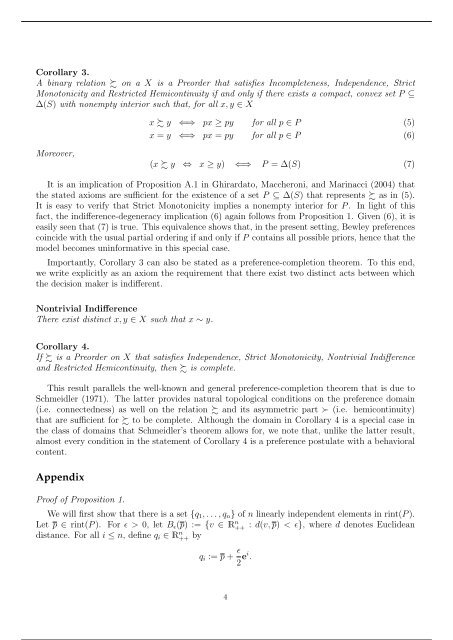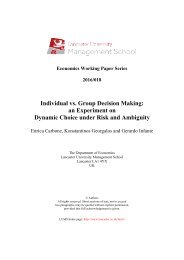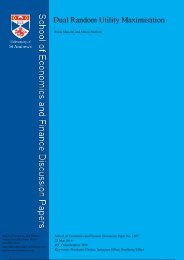Risk Neutrality Incompleteness and Degenerate Indifference
n?u=RePEc:san:wpecon:1609&r=upt
n?u=RePEc:san:wpecon:1609&r=upt
Create successful ePaper yourself
Turn your PDF publications into a flip-book with our unique Google optimized e-Paper software.
Corollary 3.<br />
A binary relation on a X is a Preorder that satisfies <strong>Incompleteness</strong>, Independence, Strict<br />
Monotonicity <strong>and</strong> Restricted Hemicontinuity if <strong>and</strong> only if there exists a compact, convex set P ⊆<br />
∆(S) with nonempty interior such that, for all x, y ∈ X<br />
x y ⇐⇒ px ≥ py for all p ∈ P (5)<br />
x = y ⇐⇒ px = py for all p ∈ P (6)<br />
Moreover,<br />
(x y ⇔ x ≥ y) ⇐⇒ P = ∆(S) (7)<br />
It is an implication of Proposition A.1 in Ghirardato, Maccheroni, <strong>and</strong> Marinacci (2004) that<br />
the stated axioms are sufficient for the existence of a set P ⊆ ∆(S) that represents as in (5).<br />
It is easy to verify that Strict Monotonicity implies a nonempty interior for P . In light of this<br />
fact, the indifference-degeneracy implication (6) again follows from Proposition 1. Given (6), it is<br />
easily seen that (7) is true. This equivalence shows that, in the present setting, Bewley preferences<br />
coincide with the usual partial ordering if <strong>and</strong> only if P contains all possible priors, hence that the<br />
model becomes uninformative in this special case.<br />
Importantly, Corollary 3 can also be stated as a preference-completion theorem. To this end,<br />
we write explicitly as an axiom the requirement that there exist two distinct acts between which<br />
the decision maker is indifferent.<br />
Nontrivial <strong>Indifference</strong><br />
There exist distinct x, y ∈ X such that x ∼ y.<br />
Corollary 4.<br />
If is a Preorder on X that satisfies Independence, Strict Monotonicity, Nontrivial <strong>Indifference</strong><br />
<strong>and</strong> Restricted Hemicontinuity, then is complete.<br />
This result parallels the well-known <strong>and</strong> general preference-completion theorem that is due to<br />
Schmeidler (1971). The latter provides natural topological conditions on the preference domain<br />
(i.e. connectedness) as well on the relation <strong>and</strong> its asymmetric part ≻ (i.e. hemicontinuity)<br />
that are sufficient for to be complete. Although the domain in Corollary 4 is a special case in<br />
the class of domains that Schmeidler’s theorem allows for, we note that, unlike the latter result,<br />
almost every condition in the statement of Corollary 4 is a preference postulate with a behavioral<br />
content.<br />
Appendix<br />
Proof of Proposition 1.<br />
We will first show that there is a set {q 1 , . . . , q n } of n linearly independent elements in rint(P ).<br />
Let p ∈ rint(P ). For ɛ > 0, let B ɛ (p) := {v ∈ R n ++ : d(v, p) < ɛ}, where d denotes Euclidean<br />
distance. For all i ≤ n, define q i ∈ R n ++ by<br />
q i := p + ɛ 2 ei .<br />
4






